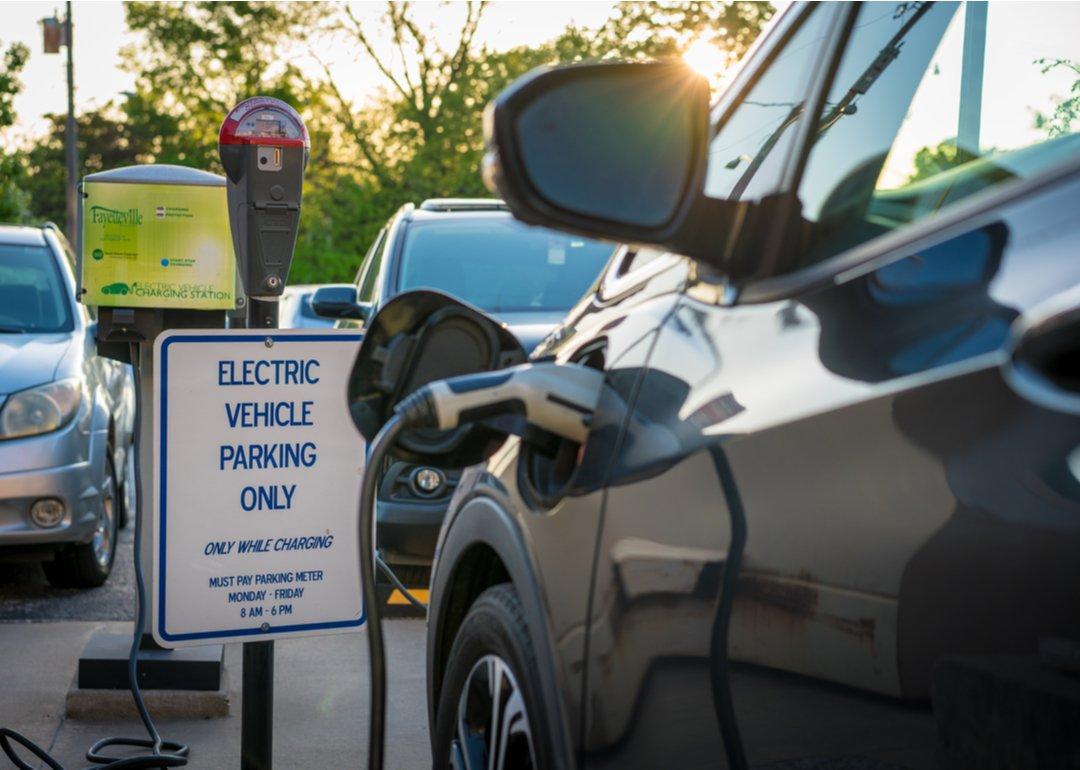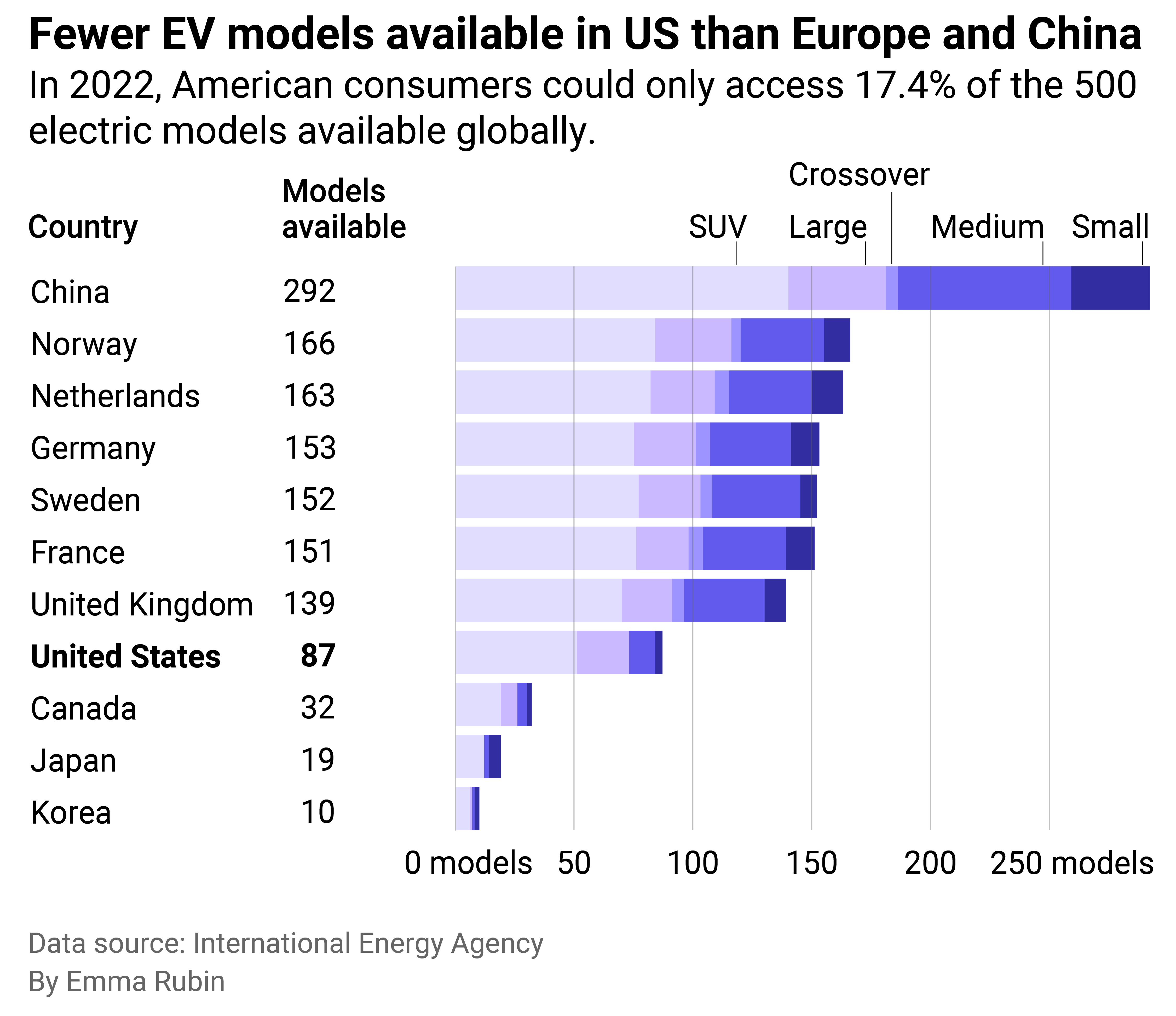Americans can get $7,500 off these EVs this year—is it enough to sway consumers?

shuttersv // Shutterstock
Americans can get $7,500 off these EVs this year—is it enough to sway consumers?
Black electric vehicle charging
Are you thinking about getting an electric car? It may cost you.
And that’s even after applying the new tax credit for qualifying vehicles—the list has gotten considerably smaller for any vehicle sold after April 18.
Congress’ Inflation Reduction Act, passed in 2022, allows any American to claim a $7,500 federal tax credit on a qualifying electric vehicle, aiming to bring the costs of transitioning to a more environmentally friendly ride down for the average consumer.
A tax credit, different from a tax deduction, is applied dollar for dollar against whatever you owe in taxes at the end of the year and can result in real money flowing back into your bank account, depending on how much you owe. For those with simple filings who owe nothing because they and their employer withheld the right amount from each paycheck, that $7,500 credit could return to them in full. Some states also offer different tax incentives for buyers of electric cars.
For the federal tax credit, there are some caveats. OK, quite a few caveats—including that the vehicle must be purchased for your personal use, weigh under 7 tons, go through its final assembly in North America, meet battery sourcing requirements, be under the price limit set by regulators, and the buyer has to earn below a certain income threshold.
Add on the fact that electric vehicles tend to carry higher price points than their combustion engine counterparts, as well as the fact that low vehicle inventory has meant dealerships can mark up their vehicles above the Manufacturer’s Suggested Retail Price—and consumers have a lot of homework in front of them before they even get to the dealership.
Truckinfo.net compiled a list of new electric vehicles eligible for tax credits under IRS rules for 2023. Data on vehicle MSRP from Edmund’s is also included.
Before new Department of Energy rules took effect in April, 41 models qualified for federal tax incentives. Now, only 32 meet the requirements. Cars from manufacturers like Volvo and Nissan no longer qualify if purchased after April 18 because they don’t meet the new battery-production and vehicle assembly criteria. It’s also important to note that pre-owned cars under $25,000 from a broader range of manufacturers can still earn drivers up to $4,000 in credits.
The average sale price of a new electric vehicle in March was $58,940, according to estimates from Kelley Blue Book. That’s closer to the average price paid for a luxury vehicle—which stood at $65,202 in March—than it is to an average new nonluxury vehicle, which was $44,182.
Markups over MSRP were less common in March than a year ago, according to Kelley Blue Book. Edmunds reports new Cadillac buyers paid the most over MSRP in recent months, shelling out an extra $4,000 on average.
It’s not just sale price American consumers will have to navigate to be a part of the electric revolution, but also higher interest rates for auto loans—and a selection of models much more limited than what is available in other countries.
![]()

Truckinfo.net
Slim selection
Bar chart showing China and Europe have more electric vehicle models available than U.S. SUVs and large cars dominate the EV production market.
Tax incentives aside, American consumers also have fewer overall options for electric vehicle models compared with other developed countries. China tops the list of nations with the most models available as of this year.
Americans have fewer than one-third of the electric vehicle model choices consumers in China have access to, according to an April report from the Paris-based International Energy Agency.
It’s well established that Americans love their large trucks and SUVs. Despite common stereotypes of electric vehicles being a small Prius-like sedan, most battery-electric models available worldwide are actually large vehicles. America’s slim selection of EV models may have more to do with the luxury nature of the vehicles produced.
The average cost for an electric vehicle in China is under $10,000, compared to $30,000 in the U.S. and Europe. According to IEA, manufacturers in the West, like Tesla, have focused on luxury models in their electric lines. More affordable mass-market models are only now starting to become more widely available.
The U.S. also lags behind the adoption of plug-in hybrid models, which represent 28% of vehicles globally but 19% in the U.S. Production of plug-in hybrids is also growing faster than battery-powered vehicles worldwide—while the inverse is true in the U.S.
Research has shown Americans worry about the availability of charging stations for driving long distances. Plug-in hybrids (PHEVs), like the tax credit-qualifying Ford Escape Hybrid, allow drivers to travel distances of around 15 to 30 miles on battery power before tapping into the gas tank for longer trips. PHEV proponents argue they do the job for most people who aren’t commuting great distances daily. Only 6 out of 32 models eligible for the tax credit are plug-in hybrids.
The good news is more models could become eligible for the tax credit in the coming years as other components of the Inflation Reduction Act play out. For example, major automakers have announced an estimated $52 billion in investments in North American EV supply chains since the bill became law, according to the IEA. The law also includes billions of dollars for building the nation’s charging station infrastructure along critical roadways in the coming years.
Read on to see which automakers and vehicle models qualify for these tax credits.
Cadillac
– LYRIQ (2023-2024)
— MSRP: $61,795 – $63,795
— Eligible for $7,500 in credits
Chevrolet
– Blazer (2024)
— MSRP: $35,100 – $45,700
— Eligible for $7,500 in credits
– Bolt (2022-2023)
— MSRP: $26,500 – $29,700
— Eligible for $7,500 in credits
– Bolt EUV (2022-2023)
— MSRP: $27,800 – $32,300
— Eligible for $7,500 in credits
– Equinox (2024)
— MSRP: Starting around $30,000
— Eligible for $7,500 in credits
– Silverado (2024)
— MSRP: $41,795 – $106,895
— Eligible for $7,500 in credits
Chrysler
– Pacifica PHEV (2022-2023)
— MSRP: $37,270 – $60,345
— Eligible for $7,500 in credits
Ford
– E-Transit (2022-2023)
— MSRP: $53,790 – $58,970
— Eligible for $3,750 in credits
– Escape Plug-in Hybrid (2022-2023)
— MSRP: $35,455 – $40,700
— Eligible for $3,750 in credits
– F-150 Lightning (Available in standard or extended range battery) (2022-2023)
— MSRP: $55,974 – $96,874
— Eligible for $7,500 in credits
– Mustang Mach-E (Available in standard or extended range battery) (2022-2023)
— MSRP: $45,995 – $63,995
— Eligible for $3,750 in credits
Jeep
– Grand Cherokee PHEV 4xe (2022-2023)
— MSRP: $59,865 – $77,075
— Eligible for $3,750 in credits
– Wrangler PHEV 4xe (2022-2023)
— MSRP: $54,735 – $62,620
— Eligible for $3,750 in credits
Lincoln
– Aviator Grand Touring (2022-2023)
— MSRP: $69,190 – $89,280
— Eligible for $7,500 in credits
– Corsair Grand Touring (2022-2023)
— MSRP: 53385
— Eligible for $3,750 in credits
Rivian
– R1S (2023)
— MSRP: Starting around $78,000
— Eligible for $3,750 in credits
– R1T (2023)
— MSRP: $67,500 – $73,000
— Eligible for $3,750 in credits
Tesla
– Model 3 Performance (2022-2023)
— MSRP: Starting at $54,380
— Eligible for $7,500 in credits
– Model 3 Standard Range Rear Wheel Drive (2022-2023)
— MSRP: Starting at $43,380
— Eligible for $3,750 in credits
– Model Y All-Wheel Drive (2022-2023)
— MSRP: Starting at $51,380
— Eligible for $7,500 in credits
– Model Y Long Range All-Wheel Drive (2022-2023)
— MSRP: Starting at $54,380
— Eligible for $7,500 in credits
– Model Y Performance (2022-2023)
— MSRP: Starting at $58,380
— Eligible for $7,500 in credits
Volkswagen
– ID.4 AWD PRO (2023)
— MSRP: Starting at $49,090
— Eligible for $7,500 in credits
– ID.4 AWD PRO S (2023)
— MSRP: Starting at $54,090
— Eligible for $7,500 in credits
– ID.4 AWD PRO S PLUS (2023)
— MSRP: Starting at $56,540
— Eligible for $7,500 in credits
– ID.4 PRO (2023)
— MSRP: Starting at $45,290
— Eligible for $7,500 in credits
– ID.4 PRO S (2023)
— MSRP: Starting at $50,290
— Eligible for $7,500 in credits
– ID.4 PRO S PLUS (2023)
— MSRP: Starting at $52,740
— Eligible for $7,500 in credits
– ID.4 S (2023)
— MSRP: Starting at $45,290
— Eligible for $7,500 in credits
– ID.4 STANDARD (2023)
— MSRP: Starting at $40,290
— Eligible for $7,500 in credits
This story originally appeared on Truckinfo.net and was produced and
distributed in partnership with Stacker Studio.